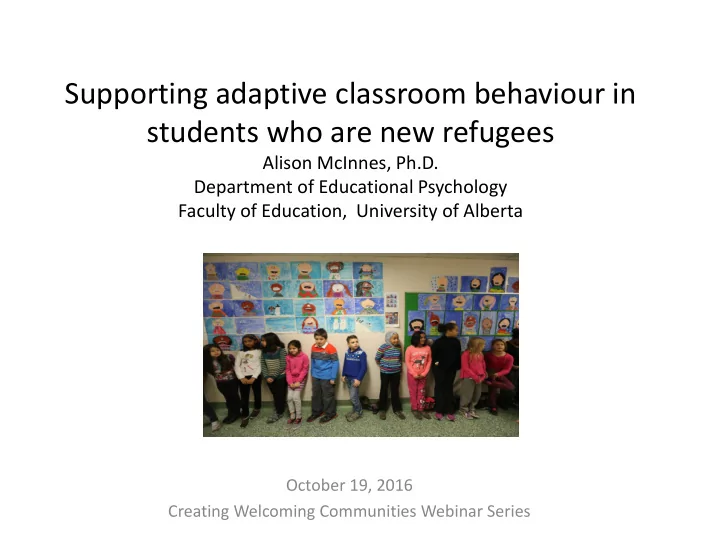

Supporting adaptive classroom behaviour in students who are new refugees Alison McInnes, Ph.D. Department of Educational Psychology Faculty of Education, University of Alberta October 19, 2016 Creating Welcoming Communities Webinar Series
However, in the face of certain barriers and challenges, they can show maladaptive behaviour that affects social success and success in the classroom A. McInnes, Ph.D., U. of Alberta
Observed behaviours – all behaviour is communicating something task refusal conflict with peers disengagement & non-compliance withdrawal A. McInnes, Ph.D., U. of Alberta
Barriers to social and academic success • language and cultural differences - understanding the communication going on in the classroom - instructional language (“teacher talk”) - talking and socializing with peers • the “hidden curriculum” - Implicit knowledge about “what to do and how to do it to be successful in the classroom” - e.g., how to please the teacher A. McInnes, Ph.D., U. of Alberta
Barriers to classroom success • Some common classroom management strategies may be counter-productive – proximity may be perceived as threatening or confusing – “the look” what does the teacher want ???? child may not understand the – specific consequences cause-effect relationship or logic of typical consequences used in the classroom (e.g., losing privileges) A. McInnes, Ph.D., U. of Alberta
How you interpret what is underlying the behaviour determines how you will deal with it in the classroom A. McInnes, Ph.D., U. of Alberta
School & Classroom Culture Mutual respect Shared responsibilities Everyone belongs Collaborative learning - reducing competition Peer supports Opportunities for choices – e.g., “right to pass” in a class discussion A. McInnes, Ph.D., U. of Alberta
Inclusive Practices & Positive Behaviour Supports Predictable routines Lots of visuals Frequent praise - concrete rewards - parent communication Differentiated instruction - activities matched to skills - provide choices Teacher monitoring - stress (anxiety, uncertainty) - energy & arousal - amount and quality of peer A. McInnes, Ph.D., U. of Alberta interaction
A few principles to keep in mind when planning instruction • Use frequent modeling of expectations (e.g., exemplars) • Along with routines, actively teach social scripts – starting a conversation, inviting someone to be a partner • Use explicit teaching supported by visuals • Anticipate challenges and provide supportive scaffolding and cues • Look for miscommunication & skill deficits before imposing consequences – What does the student have to know and be able to do to be successful in this situation? A. McInnes, Ph.D., U. of Alberta
Recommend
More recommend